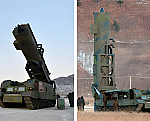Iran's attempted sneak attack did not surprise Israel or its allies. Jerusalem is now considering a response
An underestimation of Israeli and Western preparations, a demonstration of inadequate technology, or an unintended display of its own incompetence - that is how analysts assess the recent Iranian mass missile attack on Israel, which did not hit any important targets. The vast majority of the 300 or so suicide drones and ballistic missiles were shot down by Israel and its partners while still over Iranian territory, with one of the missiles landing in Bedouin territory, seriously injuring a seven-year-old girl. Iran has defended itself by saying that it was only targeting the base from which the Israelis attacked an Iranian target in Syria earlier this month and that it did not want to do more damage, especially against civilian targets, in an attempt to prevent an escalation of tensions in the region. However, Iran has achieved the exact opposite and Jerusalem is already rethinking its response to this attack, despite the efforts of its allies to take a more moderate approach.
As expected, fears of an Iranian response to the previous Israeli strike on a building Tehran called a consulate in Damascus, Syria, where an apparent Israeli drone strike also killed several senior members of the Quds Force responsible for Iran's operations abroad, have not materialized. However much the Islamist regime has sought to make a forceful show of strength through its recent attack on Israel, it has rather only highlighted its own shortcomings and inability to carry out a coordinated and effective attack.
Almost immediately after the Iranian missile launch, the Western allies responded and launched a defensive mission. In the operations centre in Washington, Joe Biden was unusually in the room with the Israeli ambassador, and all the necessary allied lines were activated. In the Red Sea, the missiles of the destroyers USS Carney and USS Arleigh Burke were activated, American F-15 fighters were launched and the British took off from Cyprus with their Eurofighters. In this combination they managed to shoot down at least half of the 300 Iranian missiles fired, the rest was taken care of by the again perfectly functioning Israeli Iron Dome air defence system and other air defence systems deployed in the region (Patriot and Arrow), and Jordan also joined in.

Despite the very quick and effective response mentioned above, some experts say it is surprising how badly Iran's strike failed, comparing the attack to the Russian army's previous operations in Ukraine using Iranian Shahid suicide drones, or to the activities of Palestinian or Lebanese terrorists from Hamas or Hezbollah operating mainly on the basis of open Iranian economic and military support. Yemeni rebels also use Iranian technology for their attacks on ships in the Red Sea area. In fact, all of the above-mentioned entities (combined with other influences) have in recent months been able to effectively and quite efficiently attack Western allies, and Israel in particular, using the same means that the Iranians used in their recent failed attack.
Indeed, the result of some three hundred weapons fired, including ballistic missiles, is as follows: a remote Israeli base lightly damaged and a single human casualty fighting for his life (a seven-year-old girl from a Bedouin community living in a desert area on which part of an Iranian missile landed). In this context, there was then various speculations that Iran had made a deliberate mistake to ascertain the positions of the Israeli and American anti-aircraft sets, including the extent of their response. However, given the mobility of air defense systems and their advanced technology, as well as the overall superiority of Israel's Western partners in the region, this theory is unlikely. Tehran then officially covers its failure with claims of its efforts not to escalate the already escalated Middle East conflict, a claim now echoed by Western allies given the expected Israeli response, however unequivocal, swift and jointly coordinated with the Israelis.
"Iran wanted to damage the strategic capabilities of the state of Israel - this has never happened before. We were prepared for Operation Iron Shield (what the Israelis call a defensive action against Iranian missiles, ed.) - we were preparing for Iran to confront our air superiority in practice," insisted Israeli army chief of staff Herzi Halevi, according to The Times of Israel, on the nature of the insidiousness of the attack. "We knew what was coming, and we think the state of Israel is very strong and knows how to deal with something like this on its own. But with a threat so numerous and so distant, we are always happy to have the United States with us," Halevi said.
It is the United States that is one of those discouraging Israel from responding forcefully to the Iranian attack. "We don't want to see another escalation, but we will obviously take the necessary measures to protect our forces in the region," Pentagon spokesman Pat Ryder commented on a possible Israeli response, according to the AP. "The U.S. will remain in close contact with our Israeli partners, as we have done throughout the weekend. But again, I want to reiterate that we are not seeking a broader regional conflict," Ryder added.
Nor do the Iranians themselves want a strong response in the form of a possible harsh Israeli intervention. "As we have already announced, Operation Fair Promise (as the Iranians call the attack on Israel, ed.) was successfully carried out to punish the aggressor. We now firmly declare that the slightest action against Iranian interests will surely be met with a harsh, widespread and painful response against all its perpetrators," Iranian President Ebrahim Raisi threatened, according to CNN.
Thus, at least given recent statements, no one wants war in the region, especially not the economically and internally crumbling Islamic Republic of Iran. However, as we last saw in February 2022 - even previous proclamations of rejection of armed conflict may eventually lead to it.








